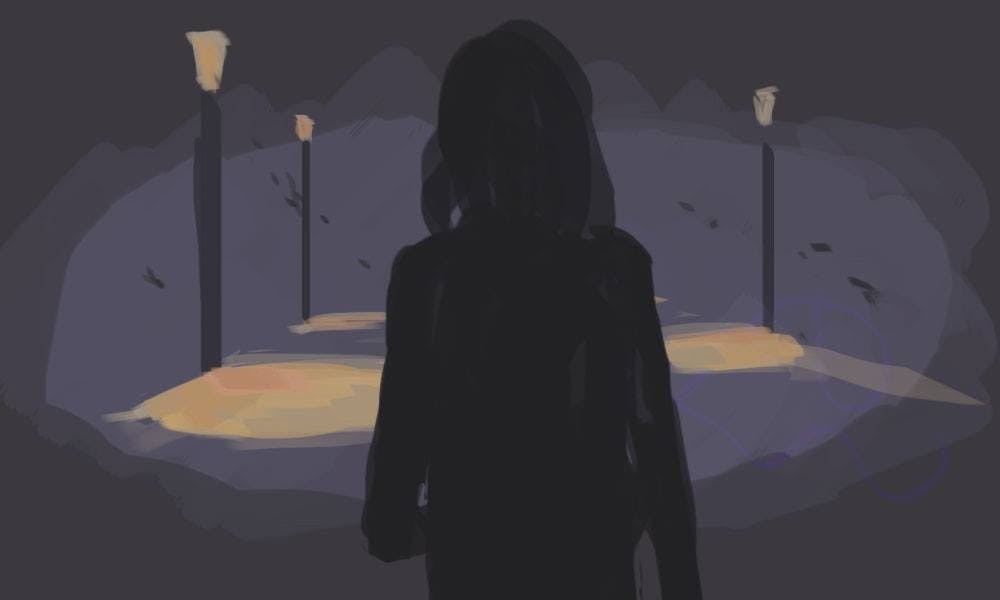
I, like so many other women, learned early on that we should only walk alone at night if it is not a desolate area, if there are eyes and witnesses that can see me. But on the Friday night of Fling, walking alone down Locust Walk, a walk I have taken so many times during my time at Penn, I felt the least safe I’ve ever felt walking through campus.
Around 3 in the morning, I was walking home from a friend’s dorm across campus. It was late, but it was one of the most exciting weekends of the school year, and my route took me straight down Locust Walk where hordes of raucous students filtered through. I’ve walked home from the library at the same time, on the same route, and always felt safe because I know the area is well lit, has many security cameras, and is constantly patrolled by campus police. On Friday night, I felt even safer because the walk was populated by so many of my peers.
And then, I was sexually harassed by four men. These men physically and verbally assaulted me as I walked down Locust Walk. They made me feel unsafe, upset, and angry. And when I called them out on it, they justified their actions and told me I was wrong for being upset.
Here’s what went down: One of the men came up not two inches behind me, gyrating and brushing his body against mine while his three friends looked on, keeling over with laughter. I turned and looked at him with a look of obvious disgust, and this guy ran to catch up with his friends ahead, laughing and jeering at me.
I called after them, “Excuse me. That’s NOT a good thing to do to a woman walking by herself at night.”
“You’re not in the Fling mindset then, if you don’t get it,” they responded.
I tried to explain to them how they made me feel threatened and intimidated, and they proceeded to laugh at me, telling me in more words that my feelings were not legitimate. They proceeded to make a joke about me being a hooker, laughing with each other that they should “hire me out for their whole pledge class,” which is how I knew they were members of a fraternity.
Upon hearing how they spoke about my body, objectifying me and stripping away my agency, I felt violated. That deep violation quickly gave way to an even deeper anger.
I continue to be angry today as I write this. I’m angry that I don’t get to feel safe walking down my own campus, that, in that moment, I had to worry if I would get home safely. I’m angry that because I wasn’t okay with being accosted, it means I’m not “fun.” I’m angry that these men think treating their own classmate like this is okay, let alone funny. I’m angry at every other man who has laughed instead of calling this behavior out, at everyone who has fueled the flames of rape culture.
I’m angry that these men feel protected at our university, and I don’t even feel protected walking home.
We have to question why these men felt so comfortable so blatantly threatening and intimidating me. We have to question the attitudes that allow rape culture to thrive on our campus. We have to question the systems that implicitly condone and normalize these pernicious, violent behaviors.
This is not the worst act of sexual violence I’ve experienced, nor was it the only act of harassment I experienced that day. For most women, acts like this are normal parts of our day, normal parts of our life. Women who identify as LGBTQ or who are disabled, importantly, are even more likely to experience sexual violence, on campuses and in our society at large.
The #MeToo movement has brought forth stories from women across lines of industry, race, class, religion, and education-level, shedding light on the pervasiveness of sexual violence. It remains clear that women face near-constant threats of sexual violence, be it at the workplace, in the classroom, or even while in transit.
Even in spaces where access is predicated on privilege, women are not removed from the constant threat of assault: A journalist last weekend interviewed 54 women at Coachella, all of whom had been sexually harassed at the festival. It is time to reconcile what the #MeToo movement means for us at Penn, on both an institutional level and an interpersonal level. That means that we must call into question the sexist power dynamics that dominate our campus. While Penn has implemented many safeguards, the students themselves must be committed to ensuring all of their peers feel secure.
So, to my fellow students, I implore you: Call out this sexual violence when you witness it, especially if you are in a position of power. Attend a PAVE training, and then act on what you’ve learned. Listen to the voices of the women around you. Believe those women that you listen to. Change won’t occur unless all of us — especially men and those who benefit from Penn’s patriarchal power structures — are committed to the safety and inclusion of every person on the campus.
I’m pissed, for myself, for other women on campus, and for women throughout the world, and I’m not going to be quiet about it. I hope you won’t be either.
JAMIE GOBRESKI is a College junior studying urban studies from Philadelphia. Gobreski is the editor of Word on the Street for 34th Street Magazine. Her email address is jamiego@sas.upenn.edu.
The Daily Pennsylvanian is an independent, student-run newspaper. Please consider making a donation to support the coverage that shapes the University. Your generosity ensures a future of strong journalism at Penn.
Donate







